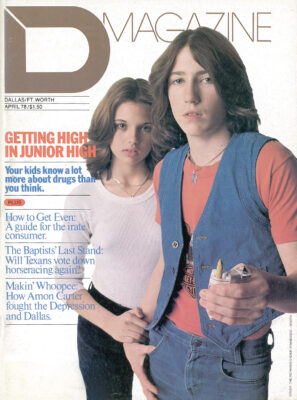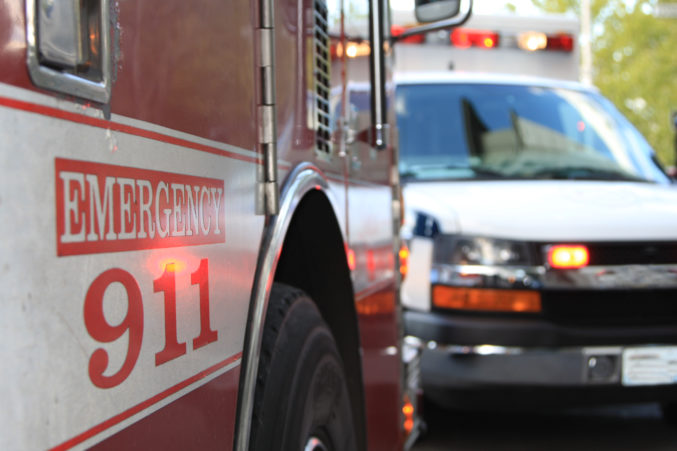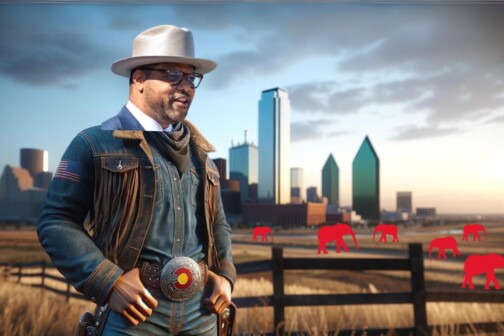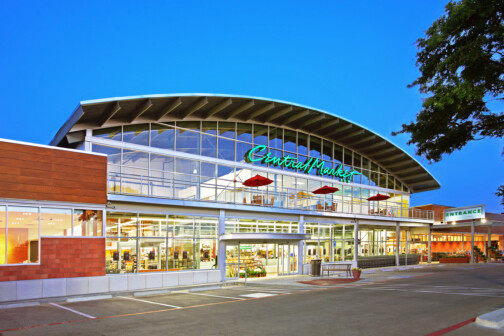The reader who hasn’t personally confronted the teenage drug scene that David Bauer depicts in this issue’s cover story may be inclined to discount the article as distorted or exaggerated. Unfortunately, the reader who makes that assumption will be wrong. Bauer’s story is based on actual cases, and is the result of two months of interviews with students, parents, and drug abuse program counselors. Most disturbing to me were the attitudes Bauer discovered: the acceptance of drugs by very young teenagers as part of a way of life, and the acquiescence of adults to a drug milieu which is so pervasive that it can’t be controlled.
There are groups in the city working to change those attitudes. One of them is the Palmer Drug Abuse Program. Begun some seven years ago in Houston, the Palmer program has since established centers in other major Texas cities, including eight centers in Dallas-Fort Worth. While hospital treatment is available through the program if necessary. the essential approach is to provide a social alternative not unlike that of Alcoholics Anonymous – positive reinforcement within a group of young people with similar drug abuse problems. With a loosely structured format guided by counselors who have successfully dealt with drug problems of their own. PDAP has shown a highly impressive rate of success, far above national standards. Much of that success has been attributed to the fact that the Palmer program has managed to implement a concurrent program for the parents of the young people involved. No one organization can solve the drug problem, but the Palmer program is at least confronting it.
Friends around town, including some of my colleagues in the media, have asked me why I am so strongly opposed to the City Council’s recent takeover of city-owned WRR-FM on Wednesday afternoons for the broadcast of its meetings. Admittedly, I’m a classical music buff and don’t like the disruption in the station’s regular programming. But my concern over the Council’s action has a deeper source.
This winter my wife and I happened to be in London when the British Broadcasting Corporation and the Labor government were locked in a small power struggle. From newspaper reports we learned the controversy began when the United Nations passed a resolution calling on member nations to use their government-owned radio stations to broadcast anti-apartheid propaganda to South Africa. The Labor government had voted with the majority, and later had issued orders to BBC management to begin the broadcasts.
Knowing the general tenor of the BBC’s political reporting, I doubt that anyone there cares one whit about defending the South African state. Nevertheless, the BBC refused to recognize its government’s orders, and its management threatened to resign en masse. As its chairman made clear, the BBC has attained a worldwide reputation for excellence because it has never allowed governmental interference in its programming decisions; its responsibility is to the British people, not to whatever government happens to be in power. That argument apparently struck a responsive chord: By the time we left England, the Labor government had backed down.
WRR-FM. like the BBC, is government-owned. The Dallas City Council, like the Labor government, has ordered programming which it considers to be “in the public interest.” It has, of course, defined “the public interest” at its own discretion. And there’s the rub: WRR-FM does not belong to the City Council, it belongs to the people of Dallas. As one of the few successful classical music stations in the United States, it is both a priceless cultural asset and a complement (and compliment) to the cultural life of this city. The city holds it in trust and that trust should be protected – not subjected like a toy to the whim of a 6-5 majority of the City Council.
WRR-FM is no longer an independent entity, good and valuable to the city in its own right. Now it serves as an instrument for the good ideas of others. When those good ideas are coming from well-meaning politicians, how long can it be before the station’s integrity is completely destroyed?
The answer rests with the six council members who voted for the takeover: John Leedom. Bill Nicol. Willie Coth-rum. Juanita Craft, John Walton, and Lucy Patterson. If you believe WRR-FM should be maintained as an independent trust for the people of Dallas, I urge you to let those council members know.





